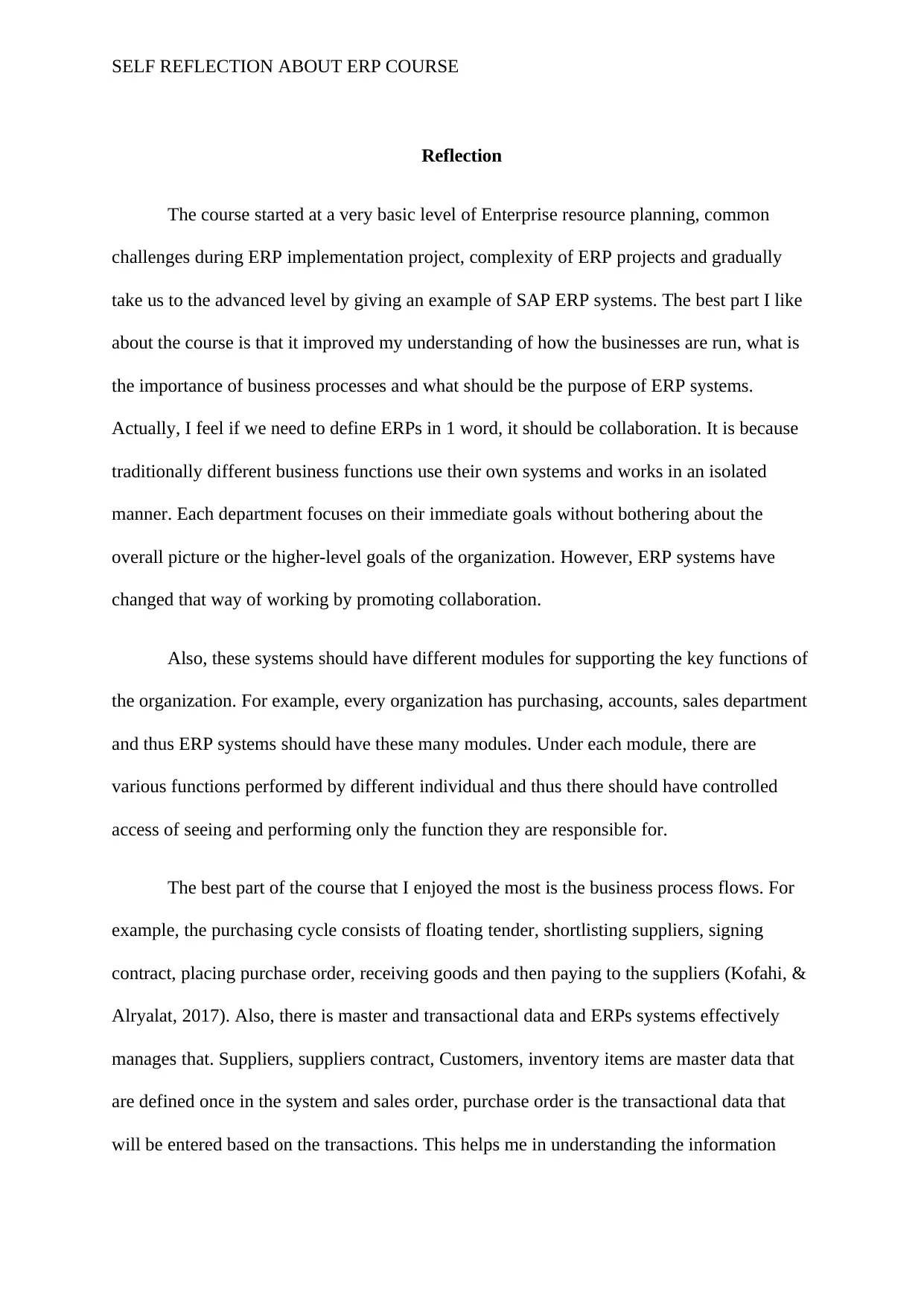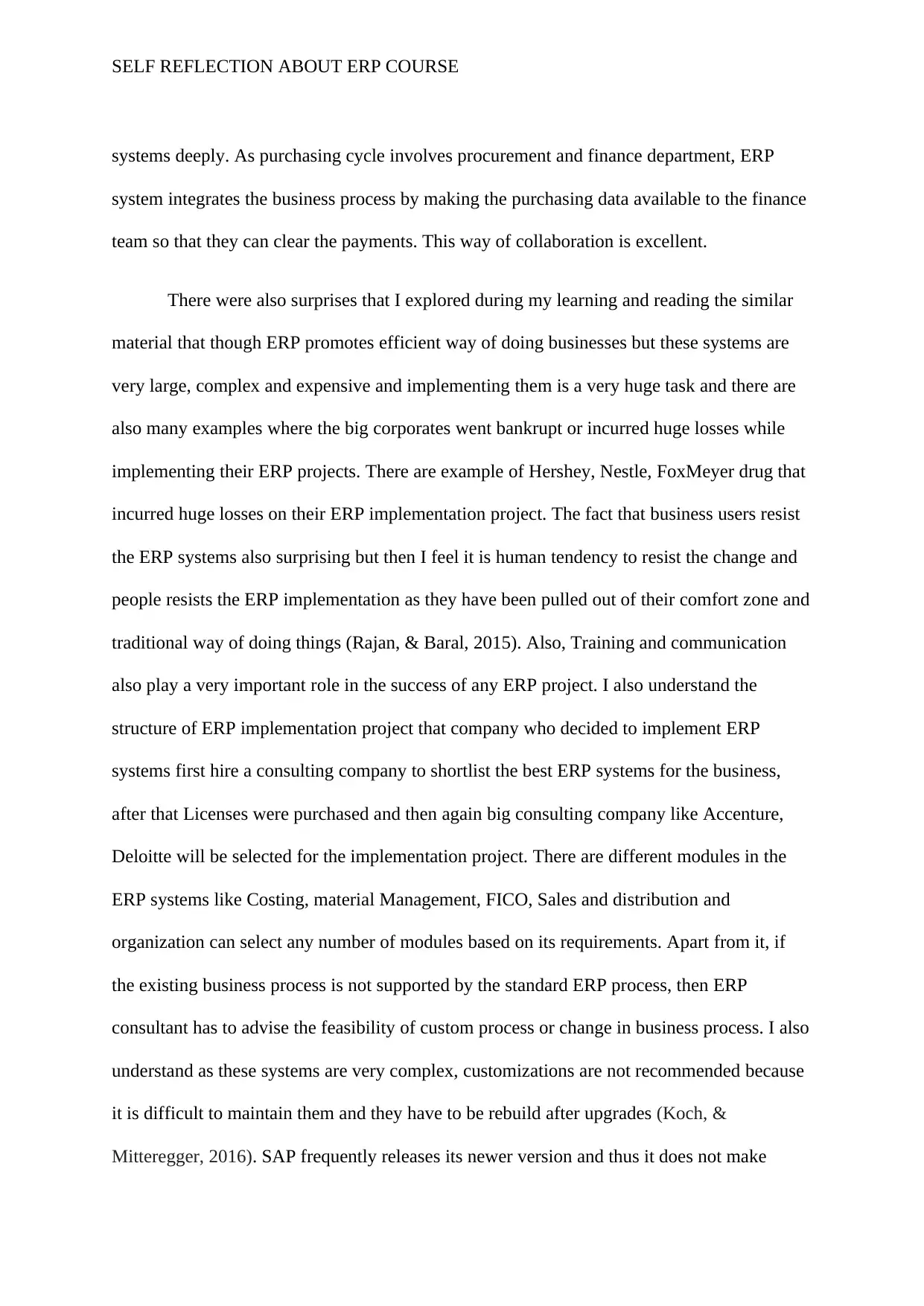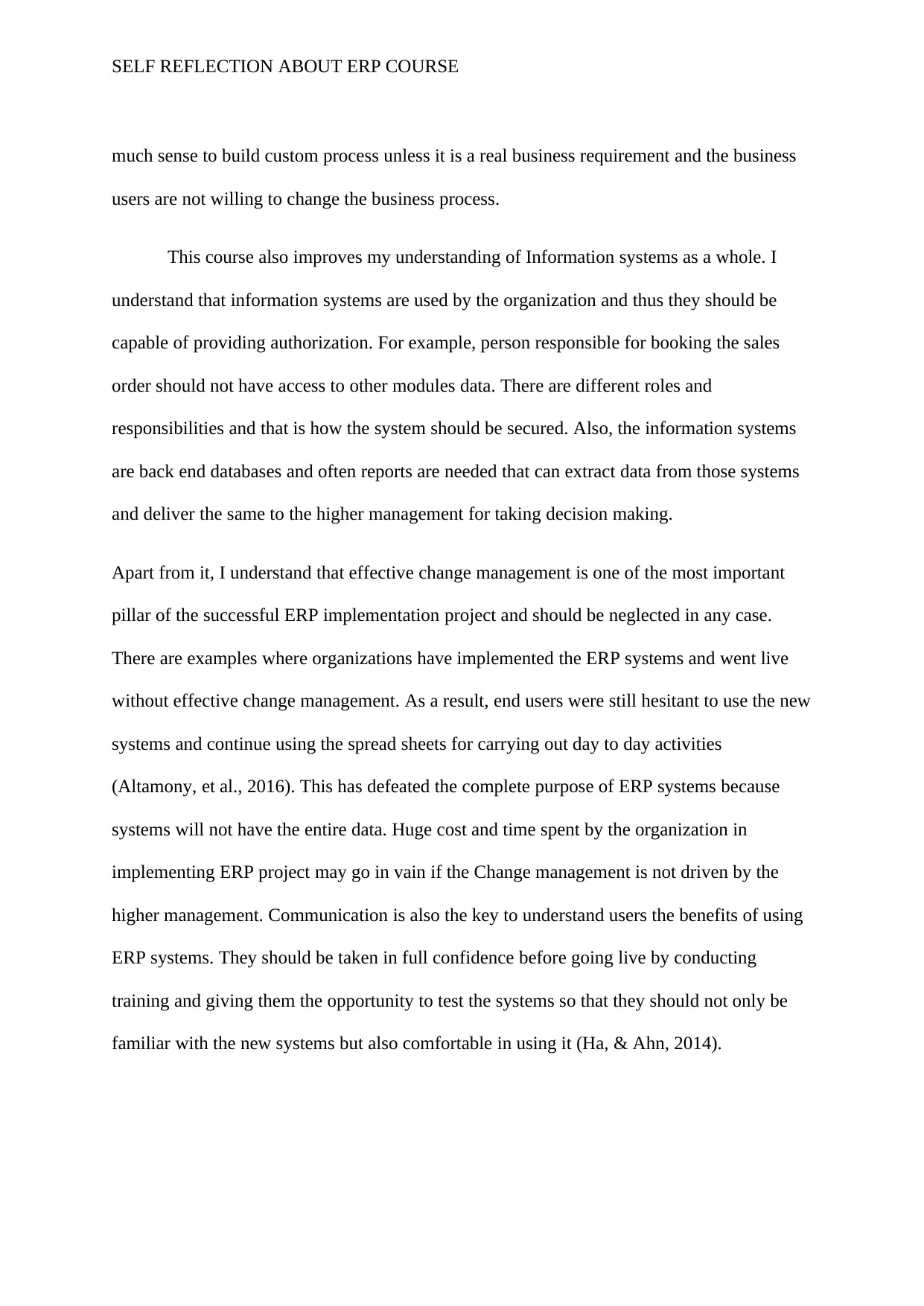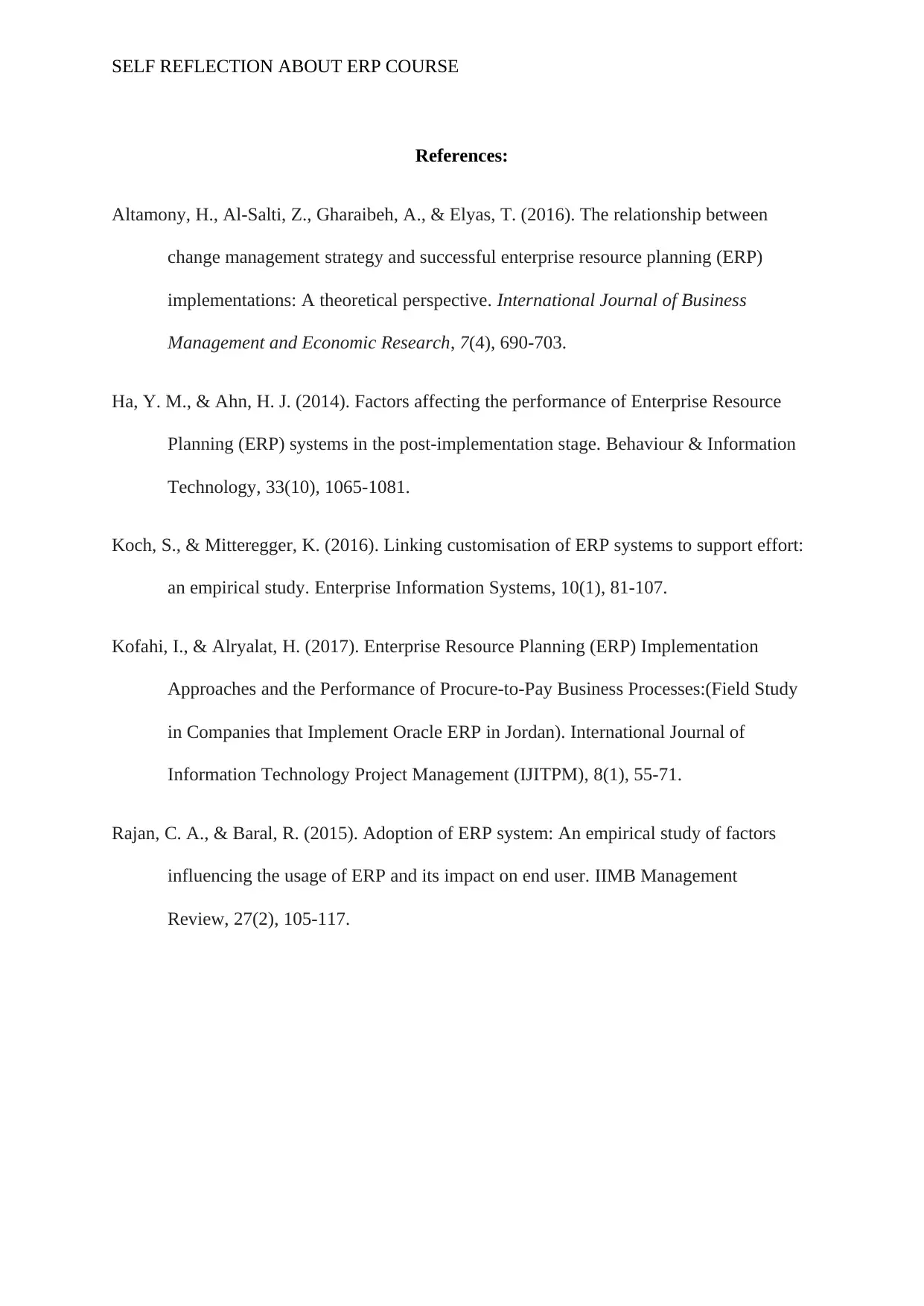Reflecting on the Enterprise Resource Planning Course and its Impact
VerifiedAdded on 2021/06/14
|5
|1283
|34
Journal and Reflective Writing
AI Summary
This reflection paper provides an overview of a student's learning experience in an Enterprise Resource Planning (ERP) course. The student reflects on the course's progression from basic ERP concepts to advanced topics like SAP ERP systems, emphasizing the importance of collaboration and integration across different business functions. The reflection highlights key aspects such as business process flows, including the purchasing cycle, and the management of master and transactional data. The student also discusses the challenges of ERP implementation, including the complexity, cost, and resistance to change, referencing examples like Hershey and FoxMeyer. Furthermore, the reflection covers the structure of ERP implementation projects, the role of customizations, the importance of information systems security, and the crucial role of effective change management and communication in ensuring successful ERP adoption. The student underscores the significance of training and user comfort in facilitating the transition to new systems.

Running head: SELF REFLECTION ABOUT ERP COURSE
Student’s name
Name of the Institute
Student’s name
Name of the Institute
Paraphrase This Document
Need a fresh take? Get an instant paraphrase of this document with our AI Paraphraser

SELF REFLECTION ABOUT ERP COURSE
Reflection
The course started at a very basic level of Enterprise resource planning, common
challenges during ERP implementation project, complexity of ERP projects and gradually
take us to the advanced level by giving an example of SAP ERP systems. The best part I like
about the course is that it improved my understanding of how the businesses are run, what is
the importance of business processes and what should be the purpose of ERP systems.
Actually, I feel if we need to define ERPs in 1 word, it should be collaboration. It is because
traditionally different business functions use their own systems and works in an isolated
manner. Each department focuses on their immediate goals without bothering about the
overall picture or the higher-level goals of the organization. However, ERP systems have
changed that way of working by promoting collaboration.
Also, these systems should have different modules for supporting the key functions of
the organization. For example, every organization has purchasing, accounts, sales department
and thus ERP systems should have these many modules. Under each module, there are
various functions performed by different individual and thus there should have controlled
access of seeing and performing only the function they are responsible for.
The best part of the course that I enjoyed the most is the business process flows. For
example, the purchasing cycle consists of floating tender, shortlisting suppliers, signing
contract, placing purchase order, receiving goods and then paying to the suppliers (Kofahi, &
Alryalat, 2017). Also, there is master and transactional data and ERPs systems effectively
manages that. Suppliers, suppliers contract, Customers, inventory items are master data that
are defined once in the system and sales order, purchase order is the transactional data that
will be entered based on the transactions. This helps me in understanding the information
Reflection
The course started at a very basic level of Enterprise resource planning, common
challenges during ERP implementation project, complexity of ERP projects and gradually
take us to the advanced level by giving an example of SAP ERP systems. The best part I like
about the course is that it improved my understanding of how the businesses are run, what is
the importance of business processes and what should be the purpose of ERP systems.
Actually, I feel if we need to define ERPs in 1 word, it should be collaboration. It is because
traditionally different business functions use their own systems and works in an isolated
manner. Each department focuses on their immediate goals without bothering about the
overall picture or the higher-level goals of the organization. However, ERP systems have
changed that way of working by promoting collaboration.
Also, these systems should have different modules for supporting the key functions of
the organization. For example, every organization has purchasing, accounts, sales department
and thus ERP systems should have these many modules. Under each module, there are
various functions performed by different individual and thus there should have controlled
access of seeing and performing only the function they are responsible for.
The best part of the course that I enjoyed the most is the business process flows. For
example, the purchasing cycle consists of floating tender, shortlisting suppliers, signing
contract, placing purchase order, receiving goods and then paying to the suppliers (Kofahi, &
Alryalat, 2017). Also, there is master and transactional data and ERPs systems effectively
manages that. Suppliers, suppliers contract, Customers, inventory items are master data that
are defined once in the system and sales order, purchase order is the transactional data that
will be entered based on the transactions. This helps me in understanding the information

SELF REFLECTION ABOUT ERP COURSE
systems deeply. As purchasing cycle involves procurement and finance department, ERP
system integrates the business process by making the purchasing data available to the finance
team so that they can clear the payments. This way of collaboration is excellent.
There were also surprises that I explored during my learning and reading the similar
material that though ERP promotes efficient way of doing businesses but these systems are
very large, complex and expensive and implementing them is a very huge task and there are
also many examples where the big corporates went bankrupt or incurred huge losses while
implementing their ERP projects. There are example of Hershey, Nestle, FoxMeyer drug that
incurred huge losses on their ERP implementation project. The fact that business users resist
the ERP systems also surprising but then I feel it is human tendency to resist the change and
people resists the ERP implementation as they have been pulled out of their comfort zone and
traditional way of doing things (Rajan, & Baral, 2015). Also, Training and communication
also play a very important role in the success of any ERP project. I also understand the
structure of ERP implementation project that company who decided to implement ERP
systems first hire a consulting company to shortlist the best ERP systems for the business,
after that Licenses were purchased and then again big consulting company like Accenture,
Deloitte will be selected for the implementation project. There are different modules in the
ERP systems like Costing, material Management, FICO, Sales and distribution and
organization can select any number of modules based on its requirements. Apart from it, if
the existing business process is not supported by the standard ERP process, then ERP
consultant has to advise the feasibility of custom process or change in business process. I also
understand as these systems are very complex, customizations are not recommended because
it is difficult to maintain them and they have to be rebuild after upgrades (Koch, &
Mitteregger, 2016). SAP frequently releases its newer version and thus it does not make
systems deeply. As purchasing cycle involves procurement and finance department, ERP
system integrates the business process by making the purchasing data available to the finance
team so that they can clear the payments. This way of collaboration is excellent.
There were also surprises that I explored during my learning and reading the similar
material that though ERP promotes efficient way of doing businesses but these systems are
very large, complex and expensive and implementing them is a very huge task and there are
also many examples where the big corporates went bankrupt or incurred huge losses while
implementing their ERP projects. There are example of Hershey, Nestle, FoxMeyer drug that
incurred huge losses on their ERP implementation project. The fact that business users resist
the ERP systems also surprising but then I feel it is human tendency to resist the change and
people resists the ERP implementation as they have been pulled out of their comfort zone and
traditional way of doing things (Rajan, & Baral, 2015). Also, Training and communication
also play a very important role in the success of any ERP project. I also understand the
structure of ERP implementation project that company who decided to implement ERP
systems first hire a consulting company to shortlist the best ERP systems for the business,
after that Licenses were purchased and then again big consulting company like Accenture,
Deloitte will be selected for the implementation project. There are different modules in the
ERP systems like Costing, material Management, FICO, Sales and distribution and
organization can select any number of modules based on its requirements. Apart from it, if
the existing business process is not supported by the standard ERP process, then ERP
consultant has to advise the feasibility of custom process or change in business process. I also
understand as these systems are very complex, customizations are not recommended because
it is difficult to maintain them and they have to be rebuild after upgrades (Koch, &
Mitteregger, 2016). SAP frequently releases its newer version and thus it does not make
⊘ This is a preview!⊘
Do you want full access?
Subscribe today to unlock all pages.

Trusted by 1+ million students worldwide

SELF REFLECTION ABOUT ERP COURSE
much sense to build custom process unless it is a real business requirement and the business
users are not willing to change the business process.
This course also improves my understanding of Information systems as a whole. I
understand that information systems are used by the organization and thus they should be
capable of providing authorization. For example, person responsible for booking the sales
order should not have access to other modules data. There are different roles and
responsibilities and that is how the system should be secured. Also, the information systems
are back end databases and often reports are needed that can extract data from those systems
and deliver the same to the higher management for taking decision making.
Apart from it, I understand that effective change management is one of the most important
pillar of the successful ERP implementation project and should be neglected in any case.
There are examples where organizations have implemented the ERP systems and went live
without effective change management. As a result, end users were still hesitant to use the new
systems and continue using the spread sheets for carrying out day to day activities
(Altamony, et al., 2016). This has defeated the complete purpose of ERP systems because
systems will not have the entire data. Huge cost and time spent by the organization in
implementing ERP project may go in vain if the Change management is not driven by the
higher management. Communication is also the key to understand users the benefits of using
ERP systems. They should be taken in full confidence before going live by conducting
training and giving them the opportunity to test the systems so that they should not only be
familiar with the new systems but also comfortable in using it (Ha, & Ahn, 2014).
much sense to build custom process unless it is a real business requirement and the business
users are not willing to change the business process.
This course also improves my understanding of Information systems as a whole. I
understand that information systems are used by the organization and thus they should be
capable of providing authorization. For example, person responsible for booking the sales
order should not have access to other modules data. There are different roles and
responsibilities and that is how the system should be secured. Also, the information systems
are back end databases and often reports are needed that can extract data from those systems
and deliver the same to the higher management for taking decision making.
Apart from it, I understand that effective change management is one of the most important
pillar of the successful ERP implementation project and should be neglected in any case.
There are examples where organizations have implemented the ERP systems and went live
without effective change management. As a result, end users were still hesitant to use the new
systems and continue using the spread sheets for carrying out day to day activities
(Altamony, et al., 2016). This has defeated the complete purpose of ERP systems because
systems will not have the entire data. Huge cost and time spent by the organization in
implementing ERP project may go in vain if the Change management is not driven by the
higher management. Communication is also the key to understand users the benefits of using
ERP systems. They should be taken in full confidence before going live by conducting
training and giving them the opportunity to test the systems so that they should not only be
familiar with the new systems but also comfortable in using it (Ha, & Ahn, 2014).
Paraphrase This Document
Need a fresh take? Get an instant paraphrase of this document with our AI Paraphraser

SELF REFLECTION ABOUT ERP COURSE
References:
Altamony, H., Al-Salti, Z., Gharaibeh, A., & Elyas, T. (2016). The relationship between
change management strategy and successful enterprise resource planning (ERP)
implementations: A theoretical perspective. International Journal of Business
Management and Economic Research, 7(4), 690-703.
Ha, Y. M., & Ahn, H. J. (2014). Factors affecting the performance of Enterprise Resource
Planning (ERP) systems in the post-implementation stage. Behaviour & Information
Technology, 33(10), 1065-1081.
Koch, S., & Mitteregger, K. (2016). Linking customisation of ERP systems to support effort:
an empirical study. Enterprise Information Systems, 10(1), 81-107.
Kofahi, I., & Alryalat, H. (2017). Enterprise Resource Planning (ERP) Implementation
Approaches and the Performance of Procure-to-Pay Business Processes:(Field Study
in Companies that Implement Oracle ERP in Jordan). International Journal of
Information Technology Project Management (IJITPM), 8(1), 55-71.
Rajan, C. A., & Baral, R. (2015). Adoption of ERP system: An empirical study of factors
influencing the usage of ERP and its impact on end user. IIMB Management
Review, 27(2), 105-117.
References:
Altamony, H., Al-Salti, Z., Gharaibeh, A., & Elyas, T. (2016). The relationship between
change management strategy and successful enterprise resource planning (ERP)
implementations: A theoretical perspective. International Journal of Business
Management and Economic Research, 7(4), 690-703.
Ha, Y. M., & Ahn, H. J. (2014). Factors affecting the performance of Enterprise Resource
Planning (ERP) systems in the post-implementation stage. Behaviour & Information
Technology, 33(10), 1065-1081.
Koch, S., & Mitteregger, K. (2016). Linking customisation of ERP systems to support effort:
an empirical study. Enterprise Information Systems, 10(1), 81-107.
Kofahi, I., & Alryalat, H. (2017). Enterprise Resource Planning (ERP) Implementation
Approaches and the Performance of Procure-to-Pay Business Processes:(Field Study
in Companies that Implement Oracle ERP in Jordan). International Journal of
Information Technology Project Management (IJITPM), 8(1), 55-71.
Rajan, C. A., & Baral, R. (2015). Adoption of ERP system: An empirical study of factors
influencing the usage of ERP and its impact on end user. IIMB Management
Review, 27(2), 105-117.
1 out of 5
Related Documents
Your All-in-One AI-Powered Toolkit for Academic Success.
+13062052269
info@desklib.com
Available 24*7 on WhatsApp / Email
![[object Object]](/_next/static/media/star-bottom.7253800d.svg)
Unlock your academic potential
Copyright © 2020–2026 A2Z Services. All Rights Reserved. Developed and managed by ZUCOL.




